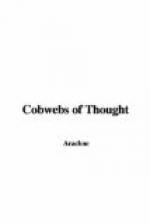Few can have read Carlyle’s writings in their youth, without having experienced an indescribable and irresistible stimulation, to accomplish some real work, to make some strenuous endeavour “before the night cometh.” Carlyle’s contempt for sloth, stings; his bitter words are a tonic, they scourge, encourage, and at times plead with poetic fervour. “Think of living. Thy life wert thou the pitifullest of all the sons of earth is no idle dream, but a solemn reality. It is thy own; it is all thou hast to front Eternity with. Work then like a star unhasting and unresting.”
The man’s soul, naked through sloth, or clothed through works, has to meet its doom, and to bear it as it best can. For Carlyle ignored the collective view of mankind, the single soul had to prostrate itself before the Supreme Power. This Supreme Power was almost as vague (to him) as George Eliot’s Permanent Influence is to us. For Carlyle did not believe “that the Soul could enter into any relations with God, and in the sight of God it was nothing.” There is nothing singular in this. The religious, but independent-minded Joubert thought “it was not hard to know God, provided one did not force oneself to define Him,” and deprecated “bringing into the domain of reason, that which belongs to our innermost feeling.”
This very well represented Carlyle’s view, but it occupies but a small place in his writings. All his books, his letters, pamphlets, histories, essays show his profound living belief in the worth of individual men, as the salt of the earth, and the young are always greatly influenced by strong personalities. But the mature mind that struggles after catholicity of taste, and wide admiration, receives some rude shocks from Carlyle’s treatment of humanity, as Dr. Garnett has well shown in his excellent biography of Carlyle; indeed it has led with some to the parting of the ways. For the hopes and inspirations of poet, reformer, teacher, became in great part to him as “the idle chatter of apes” and “the talk of Fools.”
Mazzini’s world-wide sympathies, his life of many deaths for his country, were unintelligible to Carlyle, who also described, as “a sawdust kind of talk,” John Stuart Mill’s expression of belief and interest in reforming and raising the whole social mass of toiling millions.
Bracing and stimulating, as is Carlyle’s strong, stern doctrine of independence, of work, and of adherence to Truth for its own sake, we feel the loss his character sustained, through the contempt that grew upon him for the greater part of humanity. The Nemesis of contempt was shown in his inability at last to see even in individuals, the greatest things. Physical force came to be admired by him for itself. From hero-worship, he passed “to strong rulers, and saviours of society.”




